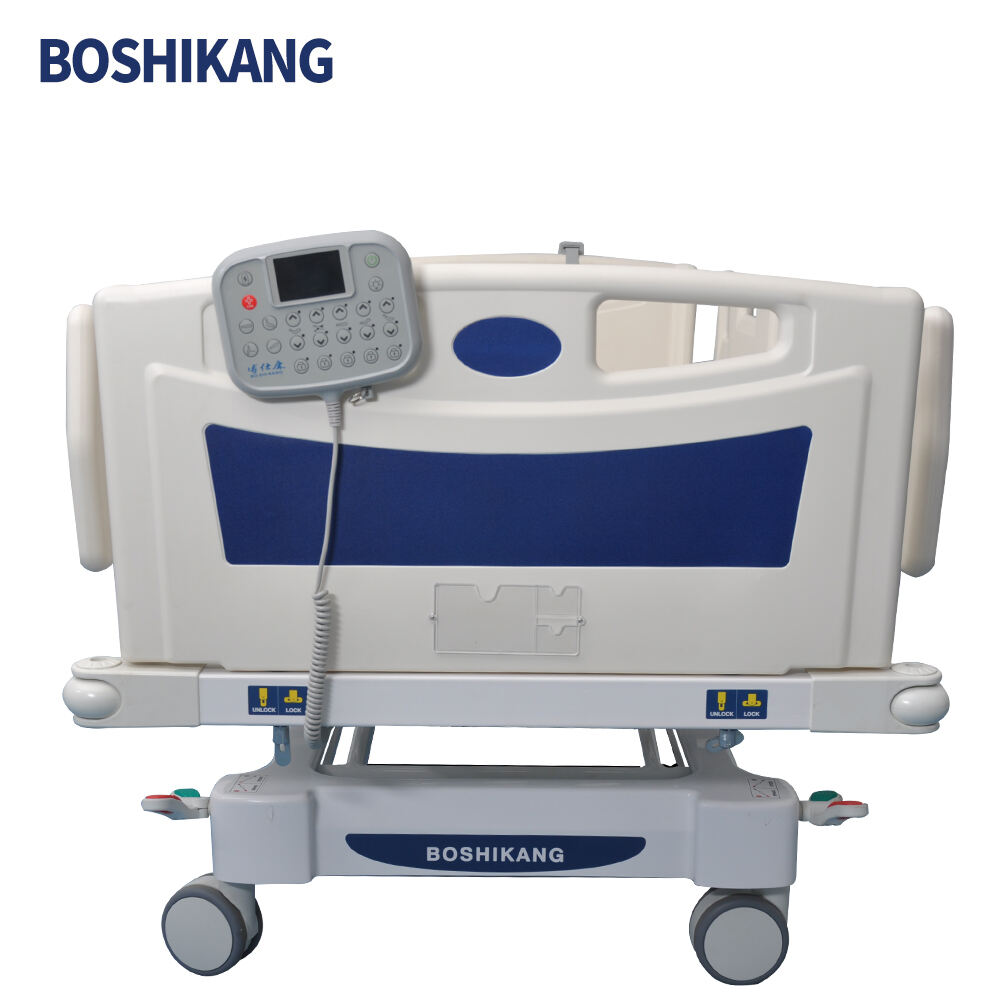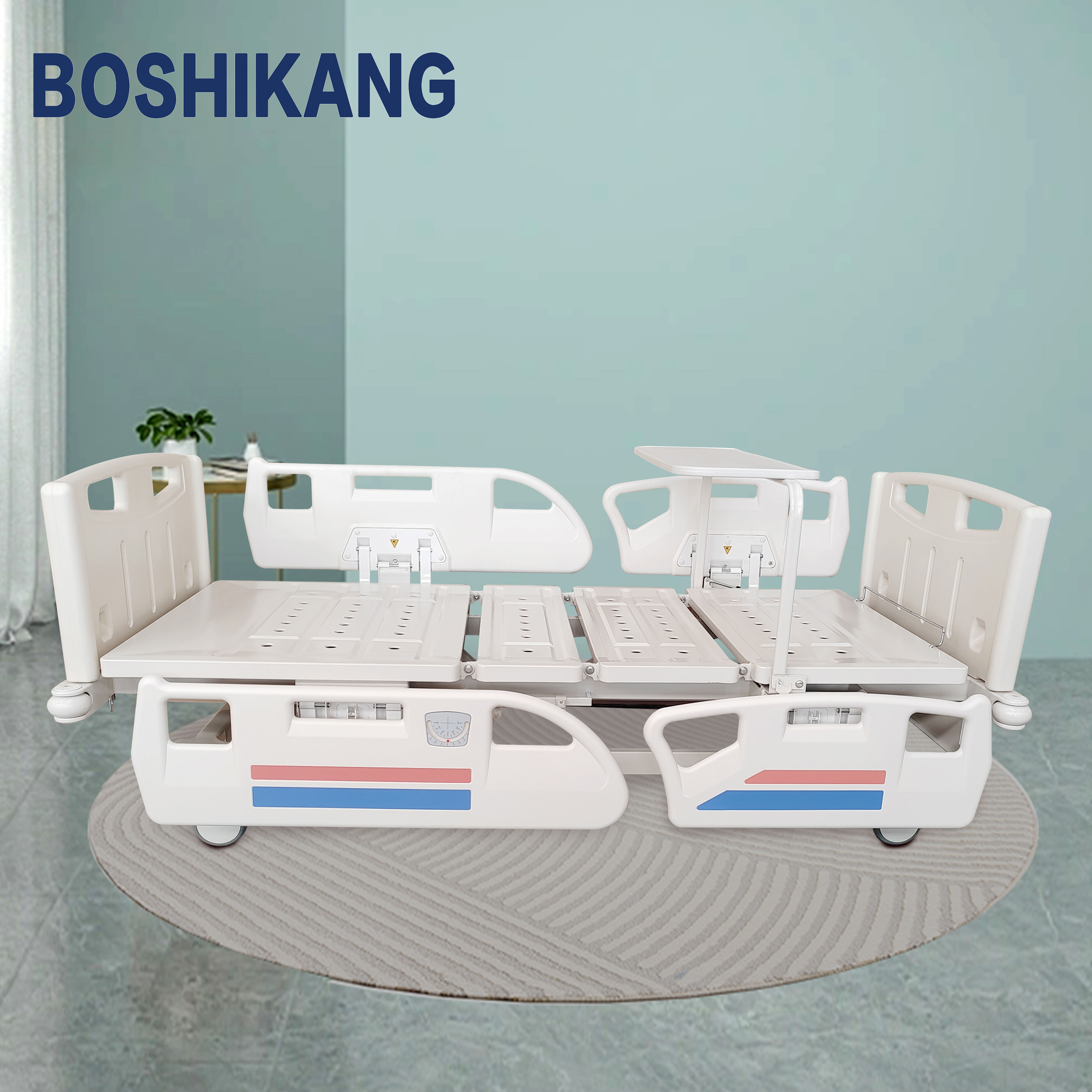Απαραίτητες Οδηγίες για την Επιλογή Ανώτερων Συνεργατών Υγειονομικού Εξοπλισμού
Όταν εξοπλίζετε μια ιατρική εγκατάσταση, η συνεργασία με τους κατάλληλους νοσοκομειακό κρεβάτι κατασκευαστές μπορεί να επηρεάσει σημαντικά την ποιότητα της φροντίδας των ασθενών και τη λειτουργική αποτελεσματικότητα. Η διαδικασία επιλογής απαιτεί προσεκτική εξέταση πολλαπλών παραγόντων, από την εμπειρογνωμοσύνη στην παραγωγή μέχρι την υποστήριξη μετά την πώληση. Οι υγειονομικές εγκαταστάσεις πρέπει να διασφαλίζουν ότι οι επιλεγμένοι κατασκευαστές τους πληρούν αυστηρά πρότυπα ποιότητας, παρέχοντας ταυτόχρονα οικονομικά αποδοτικές λύσεις που εξυπηρετούν τόσο τις ανάγκες των ασθενών όσο και του προσωπικού.
Το παγκόσμιο τοπίο της υγειονομικής περίθαλψης συνεχίζει να εξελίσσεται, καθιστώντας σημαντικό για τις ιατρικές εγκαταστάσεις να συνεργάζονται με κατασκευαστές κλινών νοσοκομείων οι οποίοι διακρίνονται για καινοτομία, αξιοπιστία και βαθιά κατανόηση των σύγχρονων απαιτήσεων υγειονομικής περίθαλψης. Αυτός ο εκτενής οδηγός θα εξερευνήσει τις σημαντικές πτυχές της επιλογής του ιδανικού κατασκευαστή για τις ιδιαίτερες ανάγκες της εγκατάστασής σας.
Βασικά Στοιχεία Αξιολόγησης της Κατασκευαστικής Αριστείας
Δυνατότητες Παραγωγής και Ενσωμάτωση Τεχνολογίας
Οι κορυφαίοι κατασκευαστές κλινών νοσοκομείων διακρίνονται μέσω προηγμένων δυνατοτήτων παραγωγής και ενσωμάτωσης καινοτόμων τεχνολογιών. Εγκαταστάσεις παραγωγής τελευταίας τεχνολογίας, εξοπλισμένες με εργαλεία ακριβείας, εξασφαλίζουν συνεπή ποιότητα σε όλα τα προϊόντα. Οι σύγχρονοι κατασκευαστές ενσωματώνουν έξυπνα χαρακτηριστικά, όπως ενσωματωμένα συστήματα παρακολούθησης ασθενών, αυτοματοποιημένους ελέγχους θέσης και συμβατότητα με λογισμικό διαχείρισης νοσοκομείων.
Οι καλύτεροι κατασκευαστές επενδύουν σε έρευνα και ανάπτυξη, βελτιώνοντας συνεχώς τα σχέδιά τους για να αυξήσουν την άνεση των ασθενών και την αποτελεσματικότητα των παρόχων φροντίδας. Αναζητήστε κατασκευαστές που επιδεικνύουν σαφή δέσμευση για τεχνολογική πρόοδο, διατηρώντας παράλληλα πρακτική λειτουργικότητα στα σχέδια των κρεβατιών νοσοκομείου.
Πρότυπα και Πιστοποιήσεις Ελέγχου Ποιότητας
Οι αξιόπιστοι κατασκευαστές κρεβατιών νοσοκομείων διατηρούν αυστηρές διαδικασίες ελέγχου ποιότητας και διαθέτουν τις σχετικές πιστοποιήσεις του κλάδου. Η πιστοποίηση ISO, η έγκριση από το FDA και η συμμόρφωση με τα διεθνή πρότυπα εξοπλισμού υγειονομικής περίθαλψης είναι απαραίτητοι δείκτες κατασκευαστικής αριστείας. Αυτές οι πιστοποιήσεις διασφαλίζουν ότι τα κρεβάτια πληρούν τις απαιτήσεις ασφαλείας και τις προδιαγραφές απόδοσης που είναι κρίσιμες για τα περιβάλλοντα υγειονομικής περίθαλψης.
Κανονικά ποιοτικά audit, ολοκληρωμένες διαδικασίες δοκιμών και τεκμηριωμένα συστήματα διαχείρισης ποιότητας πρέπει να αποτελούν τυπικές πρακτικές για κάθε κατασκευαστή που εξετάζετε. Ζητήστε λεπτομερείς πληροφορίες σχετικά με τις διαδικασίες εξασφάλισης ποιότητας και επαληθεύστε την κατάσταση πιστοποίησής τους στις αρμόδιες αρχές.

Εύρος Προϊόντων και Επιλογές Προσαρμογής
Διαφορετικό Προϊόν
Οι κορυφαίοι κατασκευαστές κρεβατιών νοσοκομείων προσφέρουν ένα ολοκληρωμένο εύρος προϊόντων που καλύπτουν διαφορετικά περιβάλλοντα υγειονομικής περίθαλψης και ανάγκες ασθενών. Από τα τυπικά χειρουργικά κρεβάτια έως τα ειδικά κρεβάτια ΜΕΘ, τα βαριατρικά μοντέλα και τις παιδιατρικές επιλογές, ο κατασκευαστής θα πρέπει να παρέχει λύσεις για διάφορες κλινικές ανάγκες. Η ποικιλομορφία αυτή δείχνει την κατανόηση των αναγκών των υγειονομικών εγκαταστάσεων και τη δυνατότητά του να λειτουργεί ως πάροχος ολοκληρωμένης λύσης.
Εξετάστε κατασκευαστές που ενημερώνουν τακτικά τις γραμμές προϊόντων τους προκειμένου να ενσωματώσουν νέα χαρακτηριστικά και να αντιμετωπίσουν επερχόμενες προκλήσεις στην υγειονομική περίθαλψη. Το χαρτοφυλάκιό τους θα πρέπει να αντικατοπτρίζει την κατανόηση διαφορετικών ιατρικών ειδικοτήτων και των απαιτήσεων φροντίδας ασθενών.
Ικανότητες προσαρμογής
Οι υγειονομικές εγκαταστάσεις συχνά απαιτούν εξειδικευμένες λύσεις για να καλύψουν συγκεκριμένες ανάγκες φροντίδας ασθενών ή περιορισμούς χώρου. Οι κορυφαίοι κατασκευαστές κρεβατιών νοσοκομείων προσφέρουν επιλογές προσαρμογής για να ανταποκρίνονται σε αυτές τις απαιτήσεις. Αυτό μπορεί να περιλαμβάνει τροποποιήσεις στις διαστάσεις του κρεβατιού, ειδικά χαρακτηριστικά για συγκεκριμένες ιατρικές καταστάσεις ή ενσωμάτωση με τα υπάρχοντα συστήματα της εγκατάστασης.
Η δυνατότητα παροχής προσαρμοσμένων λύσεων, διατηρώντας τα πρότυπα ποιότητας και λογικούς χρόνους παράδοσης, υποδεικνύει την ευελιξία και την προσανατολισμένη στον πελάτη προσέγγιση ενός κατασκευαστή. Συζητήστε πιθανές ανάγκες προσαρμογής κατά τη διαδικασία επιλογής, ώστε να διασφαλίσετε ότι ο κατασκευαστής θα μπορεί να καλύψει μελλοντικές απαιτήσεις.
Υποστήριξη μετά την πώληση και δίκτυο εξυπηρέτησης
Συντήρηση και τεχνική υποστήριξη
Αξιόπιστοι κατασκευαστές κλινών νοσοκομείων παρέχουν εκτεταμένη υποστήριξη μετά την πώληση, συμπεριλαμβανομένων υπηρεσιών τακτικής συντήρησης, τεχνικής βοήθειας και άμεσων λύσεων επισκευής. Ένα ισχυρό δίκτυο υπηρεσιών εξασφαλίζει ελάχιστη διακοπή λειτουργίας και άριστη απόδοση των κλινών καθ' όλη τη διάρκεια του κύκλου ζωής τους. Αναζητήστε κατασκευαστές που προσφέρουν προγράμματα προληπτικής συντήρησης και υπηρεσίες επισκευής σε περίπτωση έκτακτης ανάγκης.
Προγράμματα εκπαίδευσης του προσωπικού των εγκαταστάσεων σχετικά με τη σωστή λειτουργία της κλίνης και τη βασική συντήρηση μπορούν σημαντικά να αυξήσουν τη διάρκεια ζωής του εξοπλισμού και την ικανοποίηση των χρηστών. Αξιολογήστε τη δέσμευση του κατασκευαστή για συνεχή υποστήριξη και τον χρόνο αντίδρασής του σε αιτήματα υπηρεσιών.
Εγγύηση και Διαθεσιμότητα Ανταλλακτικών
Η εκτεταμένη εγγύηση και η εύκολη διαθεσιμότητα ανταλλακτικών είναι κρίσιμοι παράγοντες για τη μακροπρόθεσμη επιτυχία της επένδυσής σας σε κλίνες νοσοκομείων. Οι κορυφαίοι κατασκευαστές κλινών νοσοκομείων προσφέρουν σαφείς όρους εγγύησης και διατηρούν επαρκή απόθεμα ανταλλακτικών για να υποστηρίζουν τα προϊόντα τους καθ' όλη την αναμενόμενη διάρκεια ζωής τους.
Εξετάστε κατασκευαστές που προσφέρουν επεκτεταμένες εγγυήσεις και εγγυώνται τη διαθεσιμότητα ανταλλακτικών για αρκετά χρόνια μετά την αγορά. Αυτό διασφαλίζει υποστήριξη μακράς διάρκειας και προστατεύει την επένδυσή σας σε κρεβάτια νοσοκομείων.
Κρίσεις Κόστους και Αξιολόγηση Αξίας
Συνολικό Κόστος Ιδιοκτησίας
Κατά την αξιολόγηση κατασκευαστών κρεβατιών νοσοκομείων, λάβετε υπόψη το συνολικό κόστος ιδιοκτησίας και όχι μόνο την αρχική τιμή αγοράς. Αυτό περιλαμβάνει τα κόστη συντήρησης, πιθανές δαπάνες επισκευής και την αναμενόμενη διάρκεια ζωής των κρεβατιών. Οι ποιοτικοί κατασκευαστές παρέχουν λεπτομερείς αναλύσεις κόστους και βοηθούν τις εγκαταστάσεις να κατανοήσουν τις μακροπρόθεσμες οικονομικές επιπτώσεις της αγοράς τους.
Συγκρίνετε την κάλυψη της εγγύησης, τις απαιτήσεις συντήρησης και τα χαρακτηριστικά ενεργειακής απόδοσης που ενδέχεται να επηρεάσουν τα λειτουργικά κόστη. Η πιο οικονομικά αποδοτική λύση προέρχεται συχνά από κατασκευαστές που προσφέρουν ανθεκτικά προϊόντα με χαμηλότερες ανάγκες συντήρησης και μεγαλύτερη διάρκεια ζωής.
Χρηματοοικονομικές Επιλογές και Προγράμματα Αγοράς
Οι κορυφαίοι κατασκευαστές κρεβατιών νοσοκομείων συχνά παρέχουν ευέλικτες επιλογές χρηματοδότησης και προγράμματα αγοράς για να βοηθήσουν τις εγκαταστάσεις να διαχειριστούν την επένδυσή τους. Αυτό μπορεί να περιλαμβάνει επιλογές μίσθωσης, σταδιακά σχέδια προμηθειών ή εκπτώσεις χονδρικής αγοράς. Τα προγράμματα αυτά μπορούν να κάνουν τα υψηλής ποιότητας κρεβάτια πιο προσιτά, διατηρώντας παράλληλα περιορισμούς προϋπολογισμού.
Αξιολογήστε κατασκευαστές που δείχνουν προθυμία να εργαστούν εντός των οικονομικών παραμέτρων σας, εξασφαλίζοντας παράλληλα την ποιότητα και τα χαρακτηριστικά που χρειάζεστε για τη βέλτιστη φροντίδα των ασθενών.
Συχνές Ερωτήσεις
Ποια πιστοποιητικά πρέπει να διαθέτουν οι κατασκευαστές κρεβατιών νοσοκομείων;
Οι κατασκευαστές κρεβατιών νοσοκομείων θα πρέπει να διαθέτουν πιστοποιητικά ISO (ιδιαίτερα ISO 13485 για ιατρικά προϊόντα), έγκριση FDA όπου ισχύει και να συμμορφώνονται με ειδικά περιφερειακά πρότυπα υγειονομικού εξοπλισμού. Επιπλέον πιστοποιητικά όπως η σήμανση CE για τις ευρωπαϊκές αγορές μπορεί να είναι σημαντικά ανάλογα με την τοποθεσία σας.
Πόσο συχνά πρέπει να αντικαθίστανται τα κρεβάτια νοσοκομείου;
Η τυπική διάρκεια ζωής ενός νοσηλευτικού κρεβατιού κυμαίνεται από 10 έως 15 χρόνια με σωστή συντήρηση. Ωστόσο, ο χρόνος αντικατάστασης εξαρτάται από την ένταση χρήσης, την ποιότητα της συντήρησης και τις τεχνολογικές εξελίξεις. Οι τακτικές αξιολογήσεις βοηθούν στον καθορισμό της ανάγκης για αντικατάσταση.
Ποια είναι τα πιο σημαντικά χαρακτηριστικά που πρέπει να αναζητήσετε σε σύγχρονα νοσηλευτικά κρεβάτια;
Τα βασικά χαρακτηριστικά περιλαμβάνουν ηλεκτρικούς ελεγκτές θέσης, ενσωματωμένα συστήματα ζύγισης, χαρακτηριστικά ασφαλείας πλευρικών ράγων, επιφάνειες εύκολου καθαρισμού και συμβατότητα με συστήματα παρακολούθησης ασθενών. Προηγμένα χαρακτηριστικά μπορεί να περιλαμβάνουν τεχνολογία αντιστοίχισης πίεσης, ενσωματωμένους συναγερμούς εξόδου από το κρεβάτι και επιλογές έξυπνης σύνδεσης.
Πώς μπορούν οι εγκαταστάσεις να διασφαλίσουν ότι αποκτούν τη μέγιστη αξία από τους κατασκευαστές νοσηλευτικών κρεβατιών;
Για να διασφαλίσετε την καλύτερη αξία, συγκρίνετε το συνολικό κόστος ιδιοκτησίας, αξιολογήστε τους όρους εγγύησης, εκτιμήστε την ποιότητα της μεταπωλητικής υποστήριξης και λάβετε υπόψη τη φήμη και τη διαχρονικότητα του κατασκευαστή στην αγορά. Ζητήστε αναφορές από άλλες υγειονομικές εγκαταστάσεις και πραγματοποιήστε εκτενείς επιδείξεις προϊόντων πριν λάβετε την τελική απόφαση.
Πίνακας Περιεχομένων
- Απαραίτητες Οδηγίες για την Επιλογή Ανώτερων Συνεργατών Υγειονομικού Εξοπλισμού
- Βασικά Στοιχεία Αξιολόγησης της Κατασκευαστικής Αριστείας
- Εύρος Προϊόντων και Επιλογές Προσαρμογής
- Υποστήριξη μετά την πώληση και δίκτυο εξυπηρέτησης
- Κρίσεις Κόστους και Αξιολόγηση Αξίας
-
Συχνές Ερωτήσεις
- Ποια πιστοποιητικά πρέπει να διαθέτουν οι κατασκευαστές κρεβατιών νοσοκομείων;
- Πόσο συχνά πρέπει να αντικαθίστανται τα κρεβάτια νοσοκομείου;
- Ποια είναι τα πιο σημαντικά χαρακτηριστικά που πρέπει να αναζητήσετε σε σύγχρονα νοσηλευτικά κρεβάτια;
- Πώς μπορούν οι εγκαταστάσεις να διασφαλίσουν ότι αποκτούν τη μέγιστη αξία από τους κατασκευαστές νοσηλευτικών κρεβατιών;


